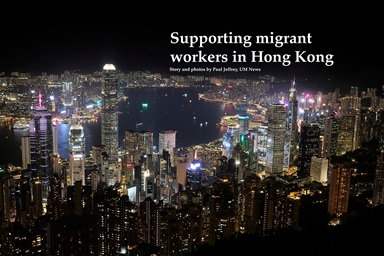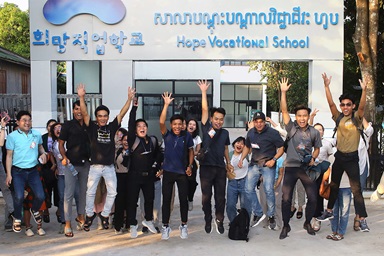About 70 college students from around the world are gathered this week to discuss topics of peace, reconciliation and human rights.
These are topics that today’s students find relevant.
“I really like the topic of peace and reconciliation. It’s definitely something I’m interested in outside of school,” said Landon Dixon, a student at Martin Methodist College and a member of First United Methodist Church of Gatlinburg, Tenn. “An opportunity to talk with people and to come do that within The United Methodist Church was really interesting.”
A record number of students are attending the eighth annual conference of the International Association of Methodist Schools, Colleges and Universities, which is focused on those topics. The students are from countries that include Japan, the United States, Brazil, Cameroon, the Democratic Republic of Congo, South Korea, the Philippines, Argentina, Taiwan, Australia, Nigeria and Myanmar.
Amos Nascimento, special assistant for global education and new initiatives at the United Methodist Board of Higher Education and Ministry, says the conference once centered on the chief executives and presidents of universities, but organizers realized they needed both faculty and students as well.
“The students are getting exposed to themes such as issues of ethics, peace education, human rights and reconciliation – values that are important to our church,” said Nascimento. “This exposure prepares them for further participation at different levels. They learn about opportunities for training, internships and scholarships. As they continue to get more deeply involved, they emerge as leaders in different areas: professors, pastors, ministry in different areas, maybe even CEOs.”
"I realize that peace building is not just the business of top leaders, but it starts from the grassroots,” said Ivan Milosi Mumba, a student from the Democratic Republic of Congo attending United Methodist-related Africa University in Zimbabwe. “Everyone has a role to play in the matter of peace. You have a role to play. I have a role to play. All of us are actors. It’s not a matter of leaving it to those (leaders) who are meeting in the conference, because we are also part of it.”
“I am interested in politics but also religion – and how the two of those things can come together to create a more peaceful world where we can use the principles of reconciliation and understanding to create a better future,” said Maggie Taylor of Nashville, Tenn., a pre-seminary and psychology major at Martin Methodist College. “As a young adult, that's really important to me.”
Alexandre Pupo Quintino, a student at Universidade de São Paulo and a youth leader in the Methodist Church in Brazil, hopes to share learnings from the conference with students in his country. “I understand that the kingdom of God, and the requirement for us as Christians, is to build a kingdom of peace and reconciliation. We need to not just dream about it but work for it. Conferences like this enable us to get the tools to do it and learn to develop new ideas and projects for achieving it.”
Bishop James Dorff, president of the Board of Higher Education and Ministry, says that for centuries, Methodist-related institutions have seen it as part of their work to develop leaders for the church and the world. “As we look to develop principled Christian leaders as one of our four areas of focus, it is extremely important that we engage our United Methodist schools, colleges and universities – that we support them, encourage them and challenge them to continue to provide and develop the leaders that we need so much.”
The backdrop of historic Hiroshima
For Mumba, the highlight of the five-day conference was a tour of Hiroshima Peace Memorial Museum and Park. “One could hear the real story about what happened in 1945. I learned it in high school, but the way I learned it was to read from a book, so it was totally different from seeing it. It really impacted me a lot,” he said.
Daphy Nataloo, who is originally from Burma (Myanmar), is working on a dissertation about her country’s refugees with post-traumatic stress disorder. A student at Yonsei University in Korea, Nataloo said one of the reasons she was interested in attending the conference was to learn about Hiroshima firsthand.
“In middle school, we learned about Hiroshima and the war and the atomic bomb, and it made me interested in what it was like and to see the reality.”
The experience of touring the peace park had a dramatic impact. “I thought, ‘This is more than what I can think of … I feel like I’m in their place, I can put myself in their shoes,’” said Nataloo. “I went back to the dorm feeling blue. I cannot express my feeling, I just feel sad … it remains in my heart. I will never forget this place.”
Connections that change lives
“At the conference, students get a little idea of what it means to be part of a global family,” said Nascimento. “Students from the U.S. meet students from Zimbabwe. Students from Brazil get together with students from Taiwan. Being exposed to a group of international students gets them more interested in learning about each other.”
“It’s awesome,” said Dixon, who is rooming with a student from Argentina and enjoying hanging out with new friends from Japan. “We're all the same. We are way more similar than we are different ... we have more in common than we have apart.”
A take-home experience
The students say they have more to take home than souvenirs and memories.
“I have a new appreciation for the people around me and how much they mean to me, and a new appreciation for peace and community,” said Taylor, who attends Edgehill United Methodist Church in Nashville. “I learned that justice isn't necessarily the highest thing, but that peace and love can make such a big difference. Also, how we as The United Methodist Church can change the tide from being competitive to just being able to express unconditional love.”
Gabrielle Johnson, a recent graduate of Bennett College in Greensboro, N.C., said she has been changed by the trip. “Honestly, it’s been a great experience, and I am happy to be able to be among people who know survivors of hate and who have conquered it and turned the hate into love and peace and something greater and bigger – something that God imagined for us.”
*Degnan is director of public relations for United Methodist Communications in Nashville, Tenn.
Like what you're reading? Support the ministry of UM News! Your support ensures the latest denominational news, dynamic stories and informative articles will continue to connect our global community. Make a tax-deductible donation at ResourceUMC.org/GiveUMCom.





